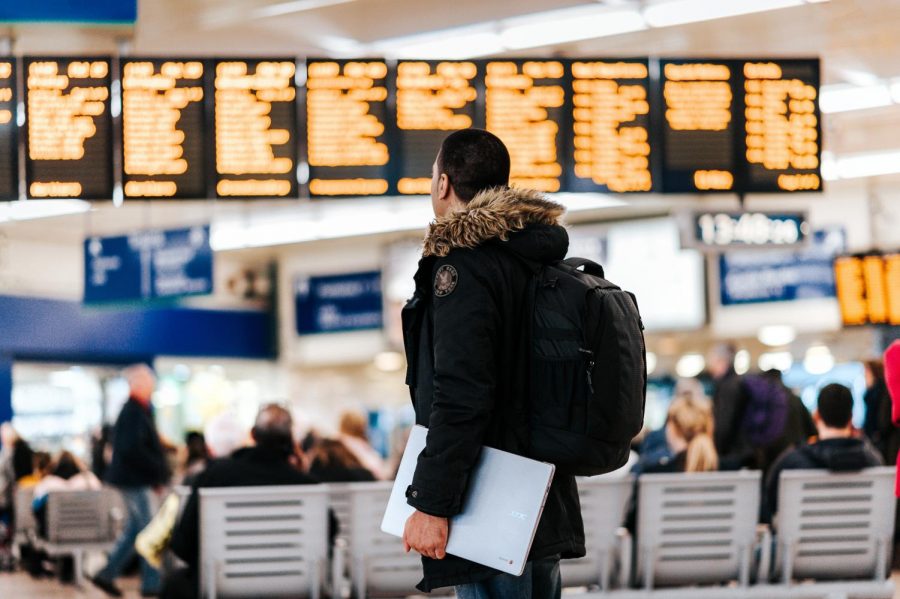From Vacations to “Stay-cations”: How Coronavirus is Impacting Students’ Travel Plans
A man stands inside of an airport looking at the LED flight schedule.
March 28, 2020
The typical spring break packing list consists of items such as swimsuits and sunscreen. This year, however, students may find themselves packing hand sanitizer and hazmat suits instead.
COVID-19, or the coronavirus, has disrupted people’s day-to-day lives all over the world as the virus has spread rapidly from country to country. In an attempt to control the spread of the virus around the world, borders are closed, available flights have become increasingly limited and many countries have placed restrictions on citizens’ movement.
For many students and families, this throws a wrench into their plans for what is traditionally peak travel time during the school year.
Senior Teagan Woodson’s plans are amongst those being cancelled due to the virus.
“We were originally going on a cruise to Haiti and Jamaica, but cancelled it,” said Woodson. “So we planned to stay in a house in the panhandle of Florida, but just recently cancelled that, too.”
Senior Jacob Kim was also supposed to go on a cruise for spring break with his family and several close family friends. However, the cruise was canceled amidst both public health concerns and the volume of people who were canceling their tickets.
“It’s kind of turned into a stay-cation, which I don’t mind,” said Kim in a phone call.
Like many who are currently practicing social distancing, Kim has had to revise his plans to be conducive to staying indoors and minimizing potential contact with the virus.
“Besides trying to make TikToks because I have nothing better to do, I’m going to procrastinate on all the online work I’m getting. And go to work,” said Kim of his at-home plans for spring break.
While Kim’s family has not personally experienced too much trouble attempting to recoup expenses such as ticket prices due to the cancellation, he has heard stories from others scheduled to go on the cruise of four-hour wait times with Delta customer service or refunds from the cruise line which barely cover a fraction of the original ticket cost.
Other travel plans, such as trips which are sanctioned through the school, are yet to face the same logistical challenges.
Law and justice teacher Timothy Hart has been sponsoring the school’s annual summer trip to Europe for five years. Conducted through the company EF Educational Tours, Hart takes a group of students around several European countries such as Italy, France and the United Kingdom for two weeks every June.
However, the current volume of coronavirus cases in Europe and measures being taken by several countries to contain the virus’ spread have raised some questions about whether students can still go on the trip.
According to Hart, the trip is very much still on.
“As of now we have not changed our planned trip. EF Tours has been in touch with us and advised they are monitoring the situation in Europe on a day to day basis,” said Hart in an email.
Though the trip is still scheduled to occur, EF Tours has issued a contingency plan to parents should the situation escalate to the point where travel is impossible.
“There are many different options that I think the parents will be happy with,” said Hart.
Though she was not planning to travel with the school, junior Meribelle Halsema also had a trip to Europe penciled in her calendar for June.
Her family’s original plan was to spend the entire month visiting England, Belgium and the Netherlands. However, they have had to cancel the vacation due to the virus.
“I’m hopeful that we’ll be able to travel soon, but it’s only a matter of time when corona dies down,” said Halsema in a phone call.
Though disappointed at not being able to go on the trip, Halsema recognizes that traveling may not be the best plan right now.
“A lot of students, including myself, are really upset about the plans cancelled,” she said. “But I’m hopeful that as more people self-quarantine, the quicker we’ll be able to bounce back and travel again.”
In spite of the gravity of the situation, Hart believes it’s simply a matter of time before the world returns to a state of normalcy.
“Just like any threat we have endured in the past, this will pass,” he said. “People are resilient and we will be traveling around the world again, I think it’s just going to take time.”


